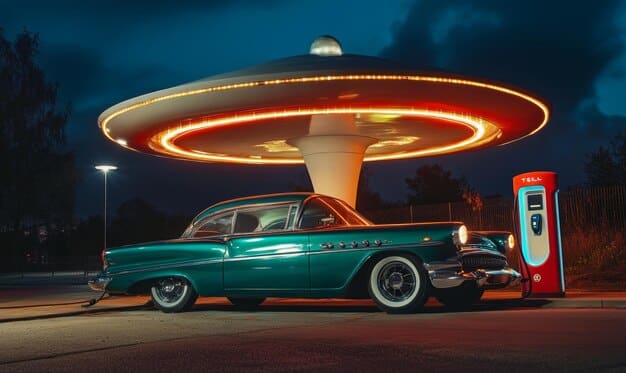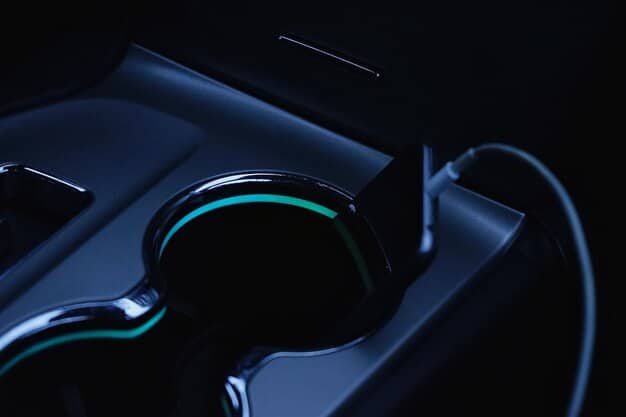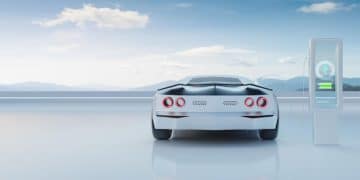Electric Vehicles and Car Culture: The Future of Driving in the US

Electric vehicles (EVs) are reshaping car culture in the US, blending sustainability with performance and technology, influencing enthusiasts’ values and driving experiences.
The roar of a gasoline engine, the smell of burning rubber, the chrome gleam of a classic car – these are the hallmarks of traditional car culture. But a new era is dawning, one powered by electricity. The impact of electric vehicles on car culture: embracing innovation and sustainability is no longer a distant possibility; it’s a rapidly evolving reality transforming how Americans perceive and interact with their vehicles.
Electric Vehicles: Redefining Performance and Aesthetics
Electric vehicles (EVs) are quickly changing perceptions of what a car can be, impacting car culture by challenging traditional ideas of performance and aesthetics.
The rise of EVs isn’t just about environmental consciousness; it’s also about pushing the boundaries of what’s possible in automotive engineering.
Instant Torque and Acceleration
One of the most significant shifts EVs bring to car culture is the instant torque and acceleration they offer. Unlike gasoline-powered cars, electric motors deliver maximum torque from a standstill, resulting in breathtaking acceleration.
- This performance is attracting a new generation of enthusiasts who value speed and responsiveness.
- EVs are proving that sustainable driving doesn’t mean sacrificing excitement.
- Many high-performance EVs can outpace traditional sports cars in a quarter-mile drag race.
A New Design Ethos
EVs are also influencing car aesthetics. With different mechanical requirements than internal combustion engines, designers have more freedom to experiment with form and function.
This freedom is leading to sleek, futuristic designs that distinguish EVs from their gasoline-powered counterparts.

In conclusion, electric vehicles redefine performance metrics and design philosophies within car culture. It highlights that innovation and sustainability are not mutually exclusive but can enhance the driving experience.
Sustainability as a Core Value in Car Culture
Sustainability is taking the front seat in car culture, steered by the eco-friendly appeal of electric vehicles.
The move towards electric cars reflects a growing concern for our planet and a desire to reduce environmental impact.
Environmental Impact
Electric vehicles produce zero tailpipe emissions, contributing to cleaner air in urban areas and reducing greenhouse gas.
- This shift is particularly significant in cities with high levels of air pollution.
- The environmental benefits of electric cars extend beyond emissions.
- EVs can also help reduce noise pollution, creating quieter and more livable communities.
Electric car owners often see themselves as environmental stewards, committed to reducing their carbon footprint. This sense of responsibility is shaping a new identity within car culture.
Ethical Consumption
Beyond environmental impact, sustainability also encompasses ethical consumption and responsible sourcing.
Car enthusiasts are paying closer attention to the origin of materials used in their vehicles, ensuring that they are sourced ethically and sustainably.

Finally, sustainability has become a cornerstone of modern car culture. From reducing emissions to promoting ethical consumption, sustainability is influencing the values and priorities of car enthusiasts.
The Social Community of EV Enthusiasts
As electric vehicles gain traction in the US, they’re not just changing what we drive; they’re creating vibrant new social communities centered around a shared passion for sustainable transportation.
These communities offer a space for EV enthusiasts to connect, share experiences, and learn from each other.
Online Forums and Groups
The internet has become a hub for EV enthusiasts. Online forums and social media groups provide platforms for discussion, troubleshooting, and sharing tips.
These online communities connect enthusiasts from all corners of the US, promoting knowledge-sharing and support.
- EV owners share reviews, compare models, and offer advice on charging and maintenance.
- These forums often organize virtual events and online meetups.
- EV-related content generates significant engagement, showing the passion for electric transition.
EV Clubs and Events
In addition to online communities, many EV enthusiasts join local clubs and attend events dedicated to electric vehicles.
These gatherings provide opportunities for enthusiasts to connect face-to-face, showcase their vehicles, and participate in organized drives.
In conclusion, the social community enhances car culture, providing support, knowledge, and camaraderie as EVs become increasingly commonplace.
Electric Vehicles and the Future of Car Modification
Car modification has always been a central part of car culture. With the rise of EVs, this tradition is evolving in exciting new ways.
EV modification isn’t just about aesthetics; it also involves optimizing performance, range, and efficiency.
Performance Upgrades
EV enthusiasts are finding innovative ways to boost the performance of their vehicles. From software tuning to battery upgrades, there are many avenues for customization.
- Software tuning can unlock additional horsepower and torque in electric motors.
- Battery upgrades can extend the range of EVs, making them more practical for long trips.
- Some enthusiasts are experimenting with aftermarket suspension and brake upgrades.
Aesthetic Customization
EV customization extends beyond performance. Enthusiasts are also adding unique touches to the aesthetics of their vehicles.
Custom paint jobs, body kits, and lighting modifications are popular ways to personalize EVs.
Electric vehicles are opening up a new frontier for car modification, blending performance enhancement with sustainability and style.
Challenges and Criticisms of Electric Car Culture
Despite the growing enthusiasm for electric vehicles, there are also challenges and criticisms that need to be addressed.
Understanding these challenges is crucial to ensure a smooth transition to a sustainable car culture.
Range Anxiety and Charging Infrastructure
One of the primary concerns of potential EV buyers is range anxiety – the fear of running out of battery power before reaching a charging station.
While the range of EVs is steadily increasing, the availability of charging infrastructure still lags behind in many areas.
Addressing these concerns is essential to encourage wider adoption of electric vehicles.
Cost and Accessibility
The initial cost of electric vehicles is often higher than comparable gasoline-powered cars. While government incentives can help offset this cost.
Making EVs more accessible to a wider range of consumers is critical to promoting inclusivity in car culture.
Range anxiety to affordability, addressing these issues will be essential for the continued growth of electric car culture.
The Hybrid Approach: Bridging Traditional and Electric Car Culture
As electric vehicles gain prominence, it’s important to consider how they coexist with traditional car culture. One approach is the hybrid model, blending the best of both worlds.
The hybrid approach recognizes the enduring appeal of classic cars while embracing the sustainability of EVs.
Electric Conversions of Classic Cars
One way to bridge the gap between traditional and electric is to convert classic cars to electric power.
This approach allows enthusiasts to preserve the aesthetics and history of their favorite vehicles while enjoying the benefits of electric propulsion.
- Electric conversions can breathe new life into classic cars.
- They can also make classic cars more reliable and easier to maintain.
- Electric conversions represent a harmonious blend of tradition and innovation.
Hybrid Car Clubs and Events
Another way to foster inclusivity is to create car clubs and events that welcome both traditional and electric vehicles.
These gatherings provide opportunities for enthusiasts from different backgrounds to connect, share their passions, and learn from each other.
By embracing a hybrid approach, it’s possible to create a car culture that is both sustainable and inclusive. It respects the past while embracing the future.
| Key Aspect | Brief Description |
|---|---|
| ⚡ Performance | Instant torque and acceleration challenge traditional car performance perceptions. |
| 🌱 Sustainability | EVs promote environmental responsibility and ethical consumption within car culture. |
| 🧑🤝🧑 Social Community | Online and local communities connect EV enthusiasts, fostering support and knowledge. |
| 🛠️ Modification | EV modification focuses on performance upgrades and unique aesthetic customizations. |
FAQ
▼
EVs prioritize instant torque and rapid acceleration, redefining performance beyond traditional horsepower and top speed. The emphasis shifts to responsiveness and agility.
▼
Electric vehicles reduce emissions, addressing ethical consumption of materials and making owners into environmental stewards, thus changing car culture.
▼
Online communities connect owners in virtual forums across the US, where they can share reviews, ask about maintenance, and organize virtual meetups.
▼
Rather than engine enhancements, EV enthusiasts boost software to increase horsepower, expand battery capacity for range, and adjust suspensions to improve drive responsiveness.
▼
Range anxiety, limited charging infrastructure in areas of the US, as well as high initial cost, are potential barriers to increasing adoption of EV across the country.
Conclusion
The impact of electric vehicles on car culture is profound, reshaping performance metrics, promoting sustainability, and fostering new communities. While challenges remain, the transition to electric represents an exciting opportunity to create a car culture that is both innovative and responsible.





